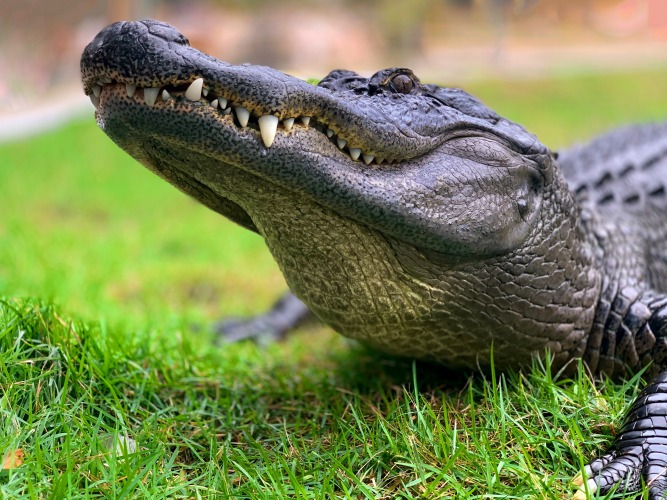Tennessee is not a natural habitat for alligators, at least not yet.
There are some places, like along the Mississippi or Tennessee Rivers, that are warm enough to support an alligator to some extent.
Game and Wildlife officials say they are starting to see a few alligators in the western part of the state, and as global warming continues, there may be more of them making their way north.

Contents
So… Are There Alligators in Tennessee?
The Tennessee Wildlife Resources Agency has reported sightings of some alligators in rural areas of West Tennessee.
When one is seen, it is a rarity, but it is becoming more common.
Alligators need warm weather, and while it is plenty warm enough in summer, these animals will suffer in the wintertime.
Alligators can go into a sort of hibernation state of dormancy that is called “brumation.”
Alligators like living in freshwater areas that have slow-moving water.
This can be a river, or it can be a swamp, a marsh, or a lake.
They tend to live along coastal areas in the southeast from North Carolina to Texas.
They live in areas close to the coast, but they do not like salt water.
So far, they are only found in West Tennessee in areas around the Mississippi River.
They have slowly moved eastward in recent years, but are still confined to the western part of the state.
The number is still very small.
Wildlife officials estimate there may be only about a dozen in the state.
In 2021, a three-foot-long alligator was found in a pond in Bradley County, in East Tennessee.
This was highly unusual, and there was speculation that it may have been a pet that someone released.
It probably would not have survived a winter in that region.
So, while Tennessee is not a natural habitat yet, there are a few in the state.
Alligator Species in Tennessee
There have been only a few alligators spotted in Tennessee, and all of them were part of the American Alligator species, which is the Alligator Mississippiensis.
Virtually all alligators in the United States are of this species.
If there is one from another species, it would have been put there by someone.
Is it Safe to Swim in Tennessee?
It is safe to swim in Tennessee’s rivers, lakes, and ponds, but there are things to be aware of.
There are not very many alligators, so your chances of running into one while swimming are very small.
If you do see an alligator, you should stay as far away as possible.
They are not known to attack people, but they will be aggressive if they feel threatened.
Here are some dangers that would be more common than alligators.
- Currents in rivers can be deceiving. They may be faster than they look, and water under the surface can move even faster. If you are not familiar with an area, ask locals about the dangers of currents.
- Creeks and rivers can also pick up debris and become contaminated. There is a danger from bacteria like E. Coli, or from chemicals like mercury or PCBs. From there, you can get various kinds of infections.
- Many rivers have muddy water and you cannot see below the surface. There could be objects under the water, like rocks or even abandoned metal objects, that could harm you if you hit them while swimming.
- Cold water can also be a hazard, especially if you are not accustomed to swimming in colder water. It may make your muscles freeze up and make swimming harder, which could put you in danger.

Interesting Alligator Facts in Tennessee
Meth Gators
A joke on a police department’s Facebook page in a small Tennessee town created an uproar over “Meth-gators,” — or alligators on meth.
A police note about an arrest said a person was trying to flush illegal drugs down the toilet before he could be arrested.
The police wanted to tell people not to flush drugs – legal or otherwise – into the local sewer system.
They said such drugs could harm wildlife in the area when the sewer material is treated.
It went on to say that there could even be alligators hyped up on meth as a result.
Some news outlets took this a bit too seriously and wrote stories about potential “meth Gators.”
The story reached news outlets as far away as England.
It was all a joke though, but the police really don’t want you to flush drugs down the toilet because they can indeed harm wildlife.
Real scientists say it would take a tremendous amount of drugs to affect an alligator.
Still, it was a story that people enjoyed, and not many thought it was real.
Florida Gators
Most Tennessee residents are glad there are not very many alligators around and this is particularly true for University of Tennessee sports fans.
Their main rival in all sports is the Florida Gators, so there might be a natural aversion to the reptile for Tennessee folks.
Location
There have not been many alligators spotted in Tennessee.
All but one are on the very western edge of the state.
There was one found in a pond in East Tennessee a couple of years ago that was likely abandoned by someone who had it as a pet.
The western edge of the state has a suitable environment for alligators, especially as the climate heats up.
State wildlife officials believe they will see more alligators moving into that area in the coming years.
Alligators vs. Crocodiles
Alligators are part of the crocodile family as far as scientific classification.
All alligators are crocodiles, but there are many other kinds of crocodiles.
One basic difference is the habitat.
Alligators live in the southeastern United States, and in China, and those are the only two kinds of true alligators.
Crocodiles live in Africa, Australia, Central America, and some areas of the Pacific Ocean.
The Florida Everglades is the only place in the world where both alligators and crocodiles live together.
Alligators prefer fresh water and crocodiles prefer salt water.
Alligators do not have the ability to expel salt water from their system, so they can tolerate only a small amount at a time.
Alligators are dark green or gray and crocodiles are a lighter version of those colors.
Alligators have wider snouts than crocodiles.
As we have discussed, there are a few alligators in Tennessee.
There are no known crocodiles outside of zoos in the state.
Crocodiles do not live in the United States.
3 Safety Tips for Swiming in Alligator-infested Waters
- Follow any rules posted. Local officials know where the alligators are, and what areas are safe. Swim only in areas where safe swimming is designated. Avoid going to remote areas to swim. Use common sense. If local officials say an area has too many alligators to make swimming safe, you should heed their advice and avoid that area. Avoid swimming at night because that is when alligators are out looking for food. If you can see an alligator, it is not a good idea to swim in that immediate area.
- Keep your eyes open. If an alligator is basking in the sun, it is probably relaxing and not much of a danger. Even so, it’s good to keep an eye on the alligator just in case he moves into the water. Stay 50 feet away from alligators at all times. If one comes toward you, back away slowly. If that happens, you should report it to park rangers. Avoid areas where there are very small alligators, who are likely babies and the mother will defend them aggressively. Avoid letting your pets get near alligators, as alligators have been known to kill and eat dogs and other small animals.
- Don’t feed or harass alligators. Alligators are very fast and agile for short distances. They can outrun anyone for about 50 feet, so stay that far away. They will attack if they feel threatened, and you can be arrested and have to pay a big fine for bothering alligators. Feeding alligators makes them dependent and they will start to be attracted to humans. In that case, they become nuisances. Also, avoid disposing of fish scraps when fishing, because the end result will be feeding alligators. Alligators will be more comfortable approaching other people if they get used to getting handouts from people.
Summary
There are a few, probably a dozen or fewer, alligators living in the wild in Tennessee.
There could be more coming as the weather gets warmer, so there are a few in the state.
They are still rare and should be treated cautiously if you happen to come upon one.
Tennessee Safety Overview
READ THE FULL REPORT: Tennessee Safety Review
Safety Index:
- OVERALL RISK: MEDIUM
- TRANSPORT & TAXIS RISK: LOW
- PICKPOCKETS RISK: MEDIUM
- NATURAL DISASTERS RISK: MEDIUM
- MUGGING RISK: MEDIUM
- TERRORISM RISK: LOW
- SCAMS RISK: LOW
- WOMEN TRAVELERS RISK: LOW
Frequently Asked Questions
Has anyone ever been killed by an alligator in Tennessee?
Alligators are very rare in the state and so far no injuries or deaths caused by alligators have been reported.
But in 2006, a woman from Tennessee was attacked and killed by an alligator in Ocala National Forest in Florida.
People found the woman stuck in the mouth of the alligator and beat the animal until it let her go, but she was already dead.
The alligator was caught a week later and police confirmed it was the same alligator.
Since 1948, there have been 442 unprovoked attacks by alligators, and about two dozen deaths reported nationwide.
There have been no reports of injuries in the state, but as they become more common, there could be injuries eventually.
How can an alligator survive the cold Tennessee winters?
Alligators can survive a fairly cold winter by doing something called brumation.
It is the reptile version of hibernation that some mammals do in the wild.
They stop eating, their heart and breathing slow way down, and their digestion also slows a lot.
In this state of dormancy, an alligator will not move and can remain alive in a cold climate even if it gets below freezing.
They can also stick their snout out of the water, and breathe that way if the water around them freezes.
Alligators are very tough animals and can survive even in freezing weather when necessary.
Why are alligators being sighted in Tennessee?
It has only been in recent years that alligators have been spotted in the western part of the state.
This is the warmest area of the state and has the mildest winters.
State wildlife officials believe alligators are moving north over time, and they expect more to move into the state as the climate gets warmer.
Alligators that have been kept as pets are often abandoned in the wild, and that may be the source of some of them.
They appear to have made their way up the banks of the Mississippi River.
The western part of the state is warmer and has more marshes, swamps, and backwaters where alligators like to live.
It is unlikely they would ever move into the eastern part of the state, which is much cooler and mountainous.












There were gators here in West Tennessee in the late 1800s as far north as the Hatchie river. These reports have been told over the years by local residents. Proof maybe lacking.